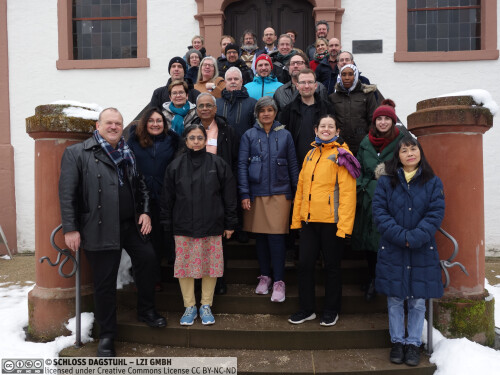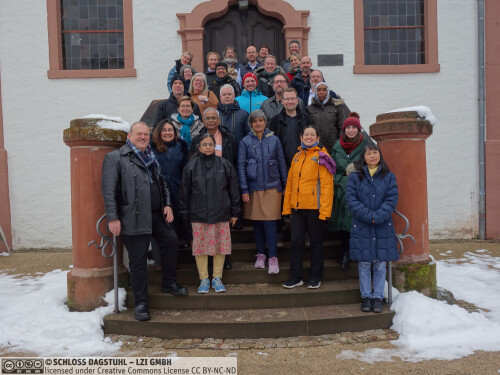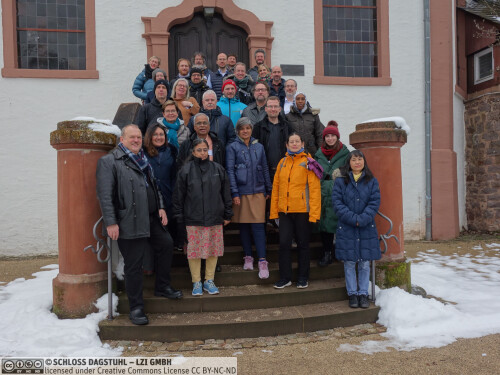Dagstuhl-Seminar 23042
Quality of Sustainable Experience (QoSE)
( 22. Jan – 25. Jan, 2023 )
Permalink
Organisatoren
- Katrien De Moor (NTNU - Trondheim, NO)
- Markus Fiedler (Blekinge Institute of Technology - Karlshamn, SE)
- Ashok Jhunjhunwala (IITM Research Park - Madras, IN)
- Alexander Raake (TU Ilmenau, DE)
Kontakt
- Michael Gerke (für wissenschaftliche Fragen)
- Jutka Gasiorowski (für administrative Fragen)
Presse/News
Programm
In line with the shift towards a more experience-centered paradigm in product and service design, Information and Communication Technology (ICT) is seen as an important enabler of immersive, and potentially transformative digital experiences. As such, ICT has a huge potential to address fundamental human needs (e.g., experiencing pleasure, relatedness); to tackle "slow-change problems" (e.g., adopting a sustainable lifestyle) and to keep up important social functions also in times of crisis (e.g., distance education, communication, entertainment) through experiences. However, two non-negligible downsides of ICT are its potential negative impact on wellbeing (e.g., addiction, blurring online/offline identities), and its growing ecological footprint, with ever-increasing demands to satisfy the Quality of Experience (QoE) of increasingly spoiled users.
On this background, this Dagstuhl Seminar set out to discuss the topic of "Quality of Sustainable Experience", and hence the challenge of how to transform existing physical and digital experiences into more sustainable (ideally fossil-free), yet human-centered and well-appreciated ones. The aim was to bring together experts from different fields addressing the multi-faceted topic from their own perspective, using their distinct tools and methods. The main objectives with the seminar were to foster new alliances, inspire, trigger scientific renewal, as well as to identify future opportunities and research challenges through a hands-on approach. The participants discussed how experiences – as the main selling point of products and services – in various ICT-related domains can be made more sustainable, how they can contribute to relevant sustainable development goals, and how the quality and degree of sustainability of such experiences may be evaluated and be better understood. The seminar adopted a bottom-up approach to identify key areas for future work within the outlined scope and converged into four topics that were further discussed in smaller groups, with the aim of better understanding current knowledge gaps and challenges and to identify topics and areas where the represented disciplines could - in the short to longer term future - make a genuine impact towards more sustainable ICT-based experiences.
The group discussions during the seminar centered around four main topics, namely (1) collaborative XR and remote attendance, (2) quantification / measures of QoSE, (3) ICT as a means to drive sustainability and (4) Needs versus greeds. During the discussions, the groups identified a set of challenges and generated “NOW”, “WOW” and “HOW” ideas [1], which are described further in Section 5.
The seminar has already resulted in a number of spin-off activities, for example at the 15th International Conference on Quality of Multimedia Experiences (QoMEX 2023), having a particular focus on the transition towards more inclusive and sustainable mutimedia experiences. More concretely, the conference is hosting a special session involving several seminar participants and organizers entitled “Towards the design and evaluation of sustainable multimedia experiences”, and one of the seminar participants was invited to give a keynote at the conference. Another concrete outcome is the initiative to apply for funding of a COST Action in order to build a community on the topic of QoSE. Finally, a video trailer has also been compiled to put focus on and raise awareness of the topics discussed at the seminar [2].
References
- COCD-box school of creative thinking. https://schoolofcreativethinking.nl/articles/cocd-box/. Accessed: 2023-05-18.
- Dagstuhl Seminar 23041: Quality of Sustainable Experience (QoSE): short video trailer. https://youtu.be/D2vswi_8O7A. Accessed: 2023-05-29.
 Katrien De Moor, Markus Fiedler, Ashok Jhunjhunwala, and Alexander Raake
Katrien De Moor, Markus Fiedler, Ashok Jhunjhunwala, and Alexander Raake
In line with the shift towards a more experience-centered paradigm in product and service design, Information and Communication Technology (ICT) is seen as an important enabler of immersive, and potentially transformative digital experiences. As such, ICT has a huge potential to address fundamental human needs (e.g., experiencing pleasure, relatedness); to tackle “slow-change problems” (e.g., adopting a sustainable lifestyle) and to keep up important social functions also in times of crisis (e.g., distance education, communication, entertainment) through experiences. However, two non-negligible downsides of ICT are its potential negative impact on wellbeing (e.g., addiction, blurring online/offline identities), and its growing ecological footprint, with ever-increasing demands to satisfy the Quality of Experience (QoE) of increasingly spoiled users.
On this background, this Dagstuhl Seminar sets out to discuss the topic of “Quality of Sustainable Experience”, and hence the challenge of how to transform existing physical and digital experiences into more sustainable (ideally fossil-free), yet human-centered and well-appreciated ones. It aims to bring together experts from different fields addressing the multi-faceted topic from their own perspective, using their distinct tools and methods. The main goals are to foster new alliances, inspire, trigger scientific renewal, as well as to identify future opportunities and research challenges through a hands-on approach using selected innovation research methods. The seminar is expected to identify and disseminate (tangibly in form of a position paper and a video trailer), how experiences – as the main selling point of products and services – in various ICT-related domains can be made more sustainable, and how the quality and degree of sustainability of such experiences can be evaluated and be better understood.
The seminar integrates the three main areas ICT, sustainability and QoE, and deliberately adopts a bottom-up approach. We are looking forward to contributions in, but not limited to the following areas:
- Sustainability of ICT, and potential of ICT to contribute to more sustainable experiences in other sectors (e.g., methodologies, best practices, design techniques, standards);
- Experience design, design for sustainability, design for change and corresponding design processes;
- Insights, analysis, visualisation (e.g., methodologies to evaluate and quantify the ecological footprint of ICT products, services, networks at different levels);
- Know-how on how to assess sustainability and on how to evaluate sustainable experiences;
- Business and policy-related aspects (e.g., sustainable business models; policies that steer towards the more sustainable design and use of ICT).
These contributions could be statements and reports by the participants in various formats (abstracts, commented presentations, short movies, etc.), addressing the kinds of experiences the participants work with, how their work relates to sustainability, which methods and approaches they bring to the seminar, and what trends and issues they would like to see to be addressed?
 Katrien De Moor, Markus Fiedler, Ashok Jhunjhunwala, and Alexander Raake
Katrien De Moor, Markus Fiedler, Ashok Jhunjhunwala, and Alexander Raake
- Stepanie Arevalo Arboleda (TU Ilmenau, DE)
- Emma Beauxis-Aussalet (VU University Amsterdam, NL) [dblp]
- Michael Best (Georgia Institute of Technology - Atlanta, US) [dblp]
- Pablo Cesar (CWI - Amsterdam, NL) [dblp]
- Katrien De Moor (NTNU - Trondheim, NO) [dblp]
- Yvonne Dittrich (IT University of Copenhagen, DK) [dblp]
- Markus Fiedler (Blekinge Institute of Technology - Karlshamn, SE) [dblp]
- Christian Herglotz (Universität Erlangen-Nürnberg, DE) [dblp]
- Oliver Hohlfeld (Universität Kassel, DE) [dblp]
- Tobias Hoßfeld (Universität Würzburg, DE) [dblp]
- Lucjan Janowski (AGH - Univ. of Science and Technology - Krakow, PL) [dblp]
- Ashok Jhunjhunwala (IITM Research Park - Madras, IN) [dblp]
- Effie Lai-Chong Law (Durham University, GB) [dblp]
- Dan Lockton (TU Eindhoven, NL) [dblp]
- Colin Maclay (USC - Los Angeles, US) [dblp]
- Alexander Raake (TU Ilmenau, DE) [dblp]
- Peter Reichl (Universität Wien, AT) [dblp]
- Reema Saha (IITM Research Park - Madras, IN)
- Daniel Schien (University of Bristol, GB) [dblp]
- Fatuma Simba (University of Dar es Salaam, TZ)
- Sascha Spors (Universität Rostock, DE) [dblp]
- Fee Steinhoff (Hochschule Koblenz - Remagen, DE)
- Kaisa Väänänen (University of Tampere, FI) [dblp]
- Denny Carolina Villamil Velasquez (Blekinge Institute of Technology - Karlskrona, SE)
- Irene Viola (CWI - Amsterdam, NL) [dblp]
- Hans-Jürgen Zepernick (Blekinge Institute of Technology - Karlskrona, SE) [dblp]
- Thomas Zinner (NTNU - Trondheim, NO) [dblp]
Verwandte Seminare
- Dagstuhl-Seminar 09192: From Quality of Service to Quality of Experience (2009-05-05 - 2009-05-08) (Details)
- Dagstuhl-Seminar 12181: Quality of Experience: From User Perception to Instrumental Metrics (2012-05-01 - 2012-05-04) (Details)
- Dagstuhl-Seminar 15022: Quality of Experience: From Assessment to Application (2015-01-04 - 2015-01-07) (Details)
- Dagstuhl-Perspektiven-Workshop 16472: QoE Vadis? (2016-11-20 - 2016-11-25) (Details)
Klassifikation
- Computers and Society
- Human-Computer Interaction
- Multimedia
Schlagworte
- Design for Sustainability
- Digitalisation
- Human-Computer Interaction
- Information and Communication Technology
- Wellbeing




 Creative Commons BY 4.0
Creative Commons BY 4.0
